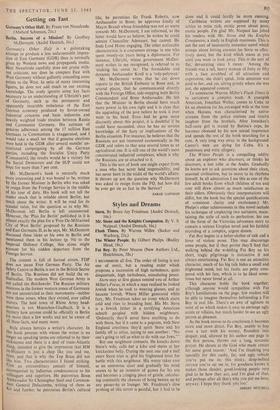Getting on Fast
Germany's Other Half. By Franz von Nesselrode. (Abelard Schuman, 21s.) Berlin. Success of a Mission? By Geoffrey McDermott. (Andre Deutsch, 16s.) Germany's Other Half is a painstaking attempt to produce a less unfavourable impres- sion of East Germany (GDR) than is normally given by Western news and propaganda media. Herr Nesselrode carefully does not praise with- out criticism, nor does he compare East with West Germany without gallantly conceding some points to the West. In spite of many interesting figures, he does not add much to our existing knowledge. The study ignores some key facts necessary to an understanding of Ulbricht's part of Germany, such as the permanent and apparently incurable imbalance of the East German economy produced by Soviet-owned industrial concerns and basic industries and heavily weighted trade treaties between Russia and Communist Germany. His estimate of genuine adherence among the 17 million East Germans to Communism is exaggerated, and 1 would take a small bet that if genuine elections were held in the GDR after several months' un- restricted campaigning by all the German Parties, including the Socialist Unity Party (Communist), the results would be a victory for the Social Democrats and the SUP could not hope for more than 7 per cent.
Mr. McDermott's book is naturally much more interesting and it was bound to be, written by the former Minister in Berlin who was asked to resign from the Foreign Service in the middle of his tour of duty. His book will not tell the reader much that is reliable about Berlin; but much about the writer. It will be read for its scandal value, but the question as to why Mr. McDermott left Berlin is left unanswered. However, the 'Plan for Berlin' published in it is almost exactly the plan for a 'Free De-Militarised City of West Berlin' proposed by the Russians and East Germans. If, as he says, Mr. McDermott discussed these ideas as his own in Berlin and Mentioned them in his lecture (p. 94) to the Imperial Defence College, this alone might account for his sudden departure from the Poreign Service.
The content is full of factual errors. FDP does not mean Free German Party. The Air Safety Centre in Berlin is not in the British Sector of Berlin. The Russians did not build the ex- Stalinallee. The modern West German Army is not called the Reichswehr. The Russian military Missions in the former western zones of Germany are not unrestricted in their movements—neither Were those zones, when they existed, ever called sectors. The host town of Rhine Army head- quarters is not Muenchen-Gladbach. It is a Mystery how anyone could be officially in Berlin for more than a few weeks and not be aware of all these facts, and many more.
Style always betrays a writer's character. In this book persons with whom the writer is no longer on speaking terms are referred to by their nicknames and there is a deal of trans-Atlantic slang, intended to give the impression that HM ex-Minister is just a chap like you and me, Mate, and that is why the Top Brass did not like him. Two characteristics I found striking. first an extraordinary conceit of himself, accompanied by ludicrous condescension to his colleagues and superiors. He patronises Bonn Ambassador Sir Christopher Steel and Comman- dant General Delacombe, writing of them as Kit and Jumbo; he patronises Berlin's cultural
life; he patronises Sir Frank Roberts, now Ambassador in Bonn; he approves kindly of Mayor Brandt whose friendship was not so warm towards Mr. McDermott, I am informed, as the latter would have us believe; he wishes he could admire Chancellor Adenauer, but cannot. He finds Lord Home engaging. The other noticeable characteristic is a coarseness strange in one who spent twenty-six years being a diplomatist. For instance, Ulbricht, whose government McDer- mott wishes to see recognised, is referred to as `sticking his snout in.' The formidable and dynamic Ambassador Kroll is a `roly-polyman.'
Mr. McDermott writes that he cut down reports to the British Embassy in Bonn and, in several places, that he communicated directly with the Foreign Office, side-stepping both Berlin Commandant and Bonn Ambassador. He felt that the Minister in Berlin should have much more power in his own right and it is clear that the upgrading of the post before he took it over went to his head. Even had he gone more discreetly about this project, it is doubtful if he could have succeeded, since he has no serious knowledge of the facts or implications of the Berlin situation. For instance, he believes that the Russians are not interested economically in the GDR and refers to that area several times as an agricultural one. It is still one of the world's most concentrated industrial complexes, which is why the Russians are so attached to it.
This is the sort of book one might expect from a man who has never held responsibility, and has never been in the midst of the world's affairs. It throws up not the question why McDermott was asked to resign from the FO, but how did he ever get on so fast in the Service?
SARAH. GAINH AM


































 Previous page
Previous page